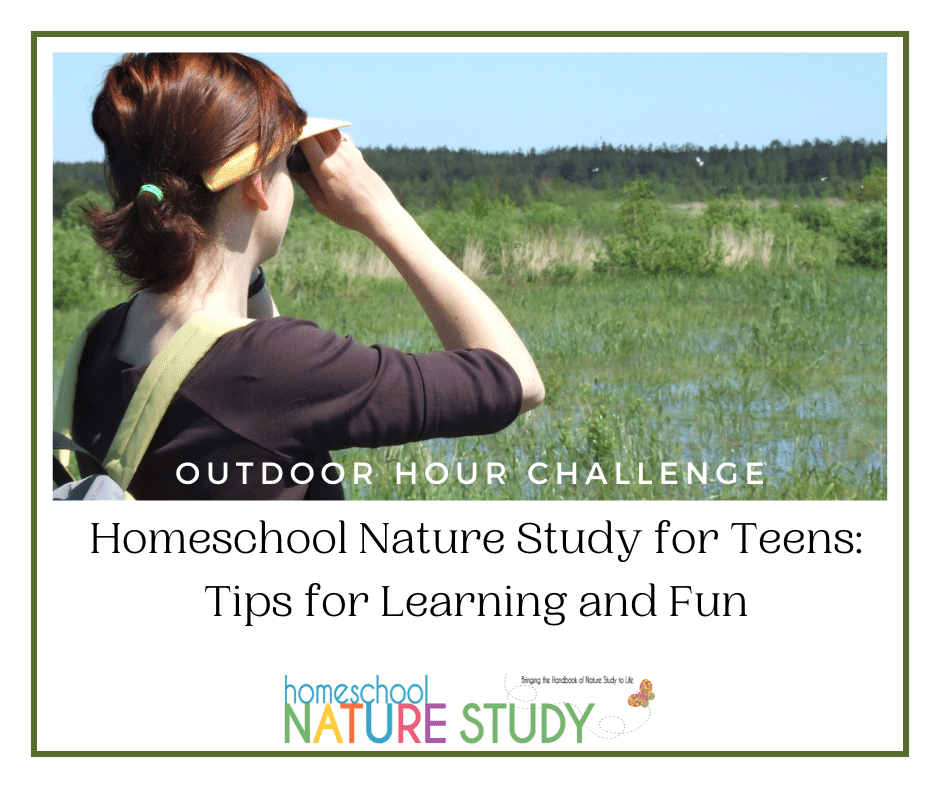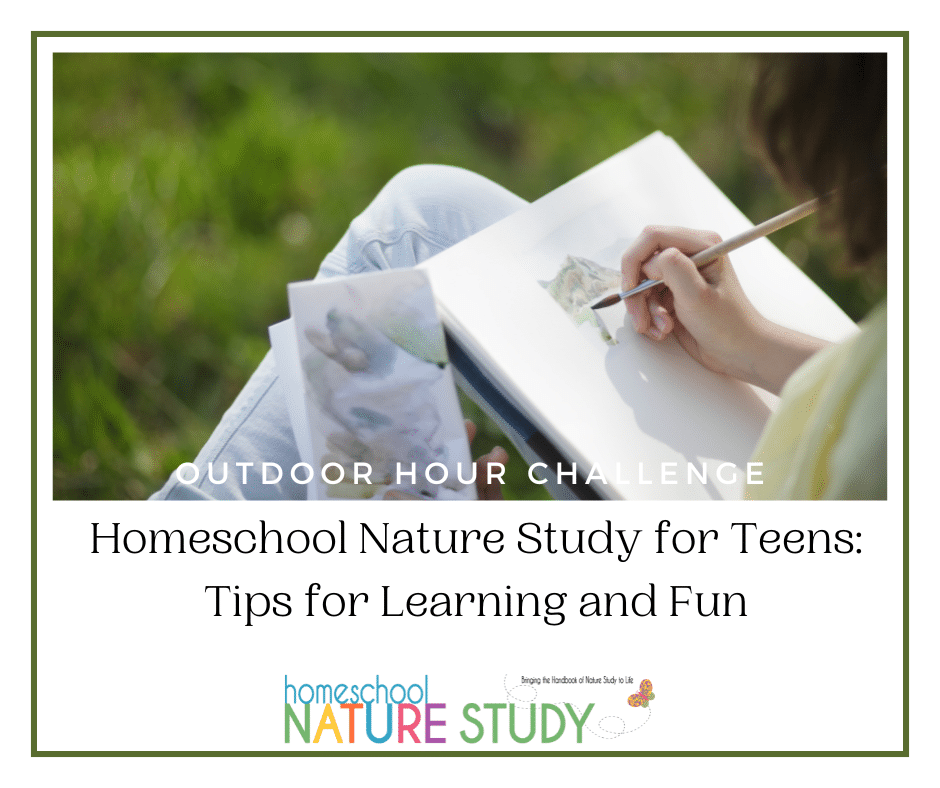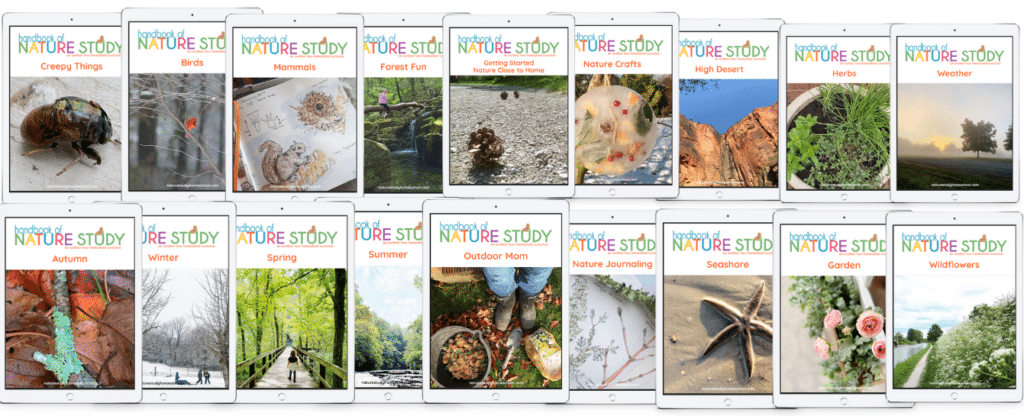
Is nature study still relevant for your homeschooled teen? Yes! It plays a crucial role in developing observation skills and much more…
Nature Study Doesn’t Have To End In The Teen Years!
Trust me! I have homeschooled two teens and I have grappled with the temptation to throw aside nature study and the arts in favor of a more bookish education. I even succumbed to the temptation once for a couple of weeks, but it just didn’t sit well in my soul or with the Charlotte Mason ethos that we had lived by for so many years.
I’m pleased to say that I came to my senses. I chose to trust that Charlotte Mason built her career on and reinstated our Friday nature studies.
Now that I have navigated through our high school years and both my daughters graduated our homeschool and their respective university courses, I can speak from a place of experience, understanding and knowledge and confidently tell you that nature study doesn’t have to end in the teen years!

Charlotte Mason believed that education should be broad and balanced, incorporating not just the academic but also the artistic and natural worlds. Nature study, plays a crucial role in developing observation skills, appreciation for the environment, and a sense of wonder.
Warning! You may want to bookmark this post as it is packed with high school nature study resources!
The Importance of Nature Study in High School
Before I give you some tips for homeschool nature study for teens, I want to touch on the importance of nature study in your homeschool high school…
Nature Study Enhances Scientific Understanding
- Field Work Integration: Nature study offers practical fieldwork opportunities, which are essential in subjects like biology, ecology, and environmental science. High school students can engage in hands-on experiences that textbooks alone cannot provide.
- Observational Skills: Regular nature study hones students’ abilities to observe, record and analyze natural phenomena, which are key skills in scientific research.
Nature Study Fosters Critical Thinking and Creativity:
- Interdisciplinary Learning: Nature study naturally integrates with other subjects such as art (through nature journaling and drawing), poetry (writing inspired by nature), and geography (understanding ecosystems and landscapes).
- Problem-solving: Encountering the real-world issues in nature, such as ecological changes or conservation challenges, encourages students to think critically and develop problem-solving skills.

Nature Study Promotes Mental and Physical Well-being:
- Stress Relief: Spending time in nature has been shown to reduce stress and improve mental health, which is particularly beneficial during the often-stressful high school years.
- Physical Activity: Engaging in outdoor activities promotes physical health and provides a healthy break from screen time and indoor study.
Nature Study Encourages Lifelong Learning and Appreciation for Nature:
- Sustainable Living: Developing a deep connection and understanding of nature fosters a sense of stewardship and responsibility toward the environment.
- Continuous Curiosity: Nature study encourages a lifelong habit of curiosity and learning, as the natural world is ever-changing and endlessly fascinating.
Tips For Homeschool Nature Study Specifically With Teens
If you’ve momentarily set aside nature study and are considering reintegration, here are some practical tips to help your teen get back into nature study:
Tip 1: Schedule Nature Study Days
Designate specific days or times each week dedicated to nature study, ensuring it remains a consistent part of your curriculum. For our family we had always reserved Fridays for our nature and arts study. It was always a day to look forward to after a week of academic learning and it was a great way to kick off the weekend!

Tip 2: Incorporate Technology in Your Nature Study for Teens
Use apps and online resources to enhance nature study, such as identifying species, tracking weather patterns, or participating in citizen science projects. It could even be a simple as using digital photography or videography!
- High School Nature and Digital Photography: Would Charlotte Mason Approve?
- Backyard Birder and Master Birder – Larkwire App Review
Tip 3: Field Trips and Nature Walks
Regularly plan outings to local parks, nature reserves, or botanical gardens to provide diverse and rich experiences. There are around 63 national parks in the United States. Visit as many of them as you can. Observe the flora, fauna, wildlife, insects, and birds that you see in each.
‘We have a wealth of posts in the archives to help you get the most of your national park’s nature study. Here are just a few to get you going:’
- The Ulitmate Guide to national Parks Nature Study For Your Homeschool
- Acadia National Park (Maine) – Tips and Images
- Paterson Great Falls National Historic Site
- Oregon State Parks – Diverse and Beautiful
- Pinnacles National Park – Tips and Images
- Nature Book Project – 10 Best of Everything National Parks – This is a great idea which links to Tip 4 on Nature Journaling!
Tip 4: Nature Journaling
Encourage students to keep detailed journals of their observations, including sketches, notes, and reflections, which integrates art and writing skills. Here are a few posts from our archives on keeping a nature journal:
- The Ulitmate Guide to Nature Journaling: Tips For Writing About Nature
- The Laws Guide to Nature Drawing and Journaling for your Homeschool
- Homeschool Nature Journal Habit

Tip 5: Cross-curricular Projects
Design projects that combine nature study with other subjects, such as writing research papers on local wildlife, creating ecological maps, or developing conservation plans.
Conservation projects can be a fantastic way for teens to learn about nature whilst taking part in a project. Here are some ideas:
- Participate in The Great Backyard Bird Count
- Volunteer as a sea turtle nest parent
- Clean up waterways, beaches and woodlands.
- Plant trees
- Build nesting boxes for birds, squirrels, or bats.
- Volunteer at a zoo or aquarium. This a great opportunity to learn about creatures that most of us will never see on a typical nature walk.
- Animal rescue or rehab centres – look for volunteer opportunities at a local animal rescue or rehab center.
- Camping or caving – both of these activities provide for an opportunity to see nature from a unique perspective. Caving may provide opportunities to watch creatures such as bats. Camping will have you observing all sorts of flora and fauna by day, and stargazing by night!
- Visit botanical gardens or butterfly houses. Bring along your nature diaries and a picnic to make for a fun day out.

Additional Resources for Homeschool Nature Study
It is important to encourage your teen to pursue their own interests in nature. Remember, “Education is the science of relations”
~ Charlotte Mason
We want our teens to form deep connections with the world around them. We must therefore provide an environment in which our teens can ask questions and learn how to find and recognise clues to the answers they seek.
To wrap up this post on homeschool nature study for teens, I am leaving you some additional nature study resources that you can delve into. Homeschool Nature Study has a wealth of resources for your nature studies in our archives so we hope that you will spend some time exploring and finding something that may be of assistance as you navigate your homeschool high school years.
- Nature Study and High School Science: A Complete Guide
- Homeschool Nature Study for Teens: Three Steps for Success!
- Homeschool High School Nature Study Ideas
- The Ulitimate Guide to Nature Study Resources
- Homeschool Ocean Nature Study and Marine Biology Resources
- Rock Cycle Activities for Middle and High School
- Does Homeschool Nature Study Count as Science?
Join the Homeschool Nature Study Membership for Nature Study Curriculum and Year Round Support
There are so many benefits to joining. You will access our full range of curriculum, our interactive learning calendar as well as a brand new homeschool nature study challenge post each week!

Connect With Our Homeschool Community On Social Media
Did you enjoy this Outdoor Hour Challenge? Be sure to tag us on Instagram @outdoorhourchallenge and use the hashtag #outdoorhourchallenge so we can see and comment!
